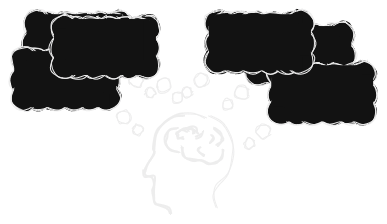Embracing my mind
The racing mind
It's as if my brain works on a different frequency. It's constantly abuzz, the gears never stopping, the cogs always turning. Like a freight train with no breaks, my mind is in a ceaseless race of thoughts. And often, it's not the simple, easily digestible thoughts. It's complex, knotty ones that require effort to untangle, effort that many around me often aren't ready or willing to invest. These thoughts, they whirl around my mind, making seemingly ordinary tasks an uphill battle, feeding a cycle of anxiety.

Take, for instance, that empty mouthwash bottle, sitting next to the shiny, new replacement. Most people would throw it out without a second thought. But I can't. My mind knows it should, but it just can't get to it because I've already started thinking about something else, pushing and repressing that empty bottle for another day, another glance. The action of discarding it becomes too daunting as the mind starts racing about all the previous times it thought it should.
Similarly, clothes begin to pile up in the corner of my room. It's not because I don't want to put them away, but rather, the task feels insurmountable in that exact moment. I start thinking about the sequence of tasks required to complete it, and it just feels... overwhelming. But by the end of the week these all get resolved, it's part of my routine. Just an issue on a regular day-to-day schedule.
Not just day-to-day activies, but understanding and connecting with other people's emotions, as well as my own, often feels like a monumental task. It's not that I lack empathy. On the contrary, I feel emotions deeply, perhaps too deep. It's the process of understanding, of deciphering the nuances that people often take for granted, that is difficult. It's almost as if my brain works with a different set of rules, making it difficult to intuitively grasp the commonly accepted emotional norms. Interactions with new people can be daunting, tending to avoid eye contact and trying hard to jumble the thoughts in the correct order as opposed to just blurt them out, tending to opt out to staying quiet. Interactions drain the social battery quickly.
Wired for engineering
I often contemplate that my mind seems specifically crafted for engineering. I have this inherent, almost compulsive desire to deconstruct everything around me, to delve into the intricate mechanics that power our world. Whether it's a car, understanding the forces acting upon it, or dissecting how it propels forward, or a computer program, scrutinizing the underlying protocols, the functioning of its applications, I find a strange satisfaction in deciphering what makes things tick - and what causes them to falter.
In a way, it's as if my neural pathways are architecturally designed for engineering, creating a specialized blueprint that lends itself naturally to this field. This intrinsic wiring, I believe, is a significant factor behind my successes - and maybe losses and demise, within the Software Engineering domain.

Work
At work, my mind can be both a blessing and a curse. I excel at identifying dependencies and solutions, potential problem areas, edge cases that others might overlook. However, my thoughts come forth in a cascade, not the tidy linear progression most people expect. I often find myself contemplating an issue long after my team has moved on, dissecting every potential scenario in my head. This disjointed approach can appear rude, or disruptive to others, especially during meetings, and by all means it's not intentional.
Over time, I've learned to embrace these idiosyncrasies, turning them into strengths. Documentation and diagrams have become my best friends. They help me keep track of my torrent of ideas, prevents them from getting lost in the whirlwind that is my mind. It's as if putting them down on paper gives them a physical form, a weight, something tangible I can return to and deal with when I'm ready.
Diagrams help me convey my thoughts on paper, allowing to nurture the thoughts with the rest of the team, untangling the interconnected thoughts into something that is clear and concise.
Coping
To tame my racing mind, I've developed my own coping mechanisms.
- Music, blaring at full volume, helps to drown out the background hum of my thoughts
- Having Netflix on play in the background while working from home
- YouTube videos to lull me to sleep
These provide enough distraction to slow the mental sprint. They are like soothing lullabies for my constantly churning mind, creating a melodic symphony of thoughts, allowing me to exist in harmony with my unique way of being.
Routine
I've discovered that implementing patterns and regular routines can also serve as effective strategies to manage my unique challenges. Those accumulating clothes and the empty mouthwash bottle? They eventually get sorted out by the end of the week. It's not that these tasks are impossible; rather, in their immediate moment, they present as more daunting than they truly are.
I'd like to say that my weeks are structured around a rhythm, a routine that I've designed and followed, but in reality it's mostly the weekends that follow this. I set aside dedicated time to focus on self-care and addressing those tasks and thoughts that have been nudged aside during the bustling week. These are the days when I unpack the corners of my mind, sorting through the thoughts that have been shelved, and deal with the tasks that have been postponed. It's an essential part of my routine, giving me the opportunity to clear my mental and physical space, creating room for the next influx of thoughts and tasks.
In these quiet moments, I allow myself the luxury of time to unwind. It's more than just relaxation; it's a process of gently unwrapping the tightly coiled spring of my mind, letting it breathe, and providing it with the space it needs to recuperate. It's about letting the waves of my consciousness find their natural ebb and flow after a week of high tide.
Acceptance and TL;DR
While there may be words out there that could potentially encapsulate my distinctive way of thinking, like 'neurodiverse', I consciously choose not to use that. The process of pursuing a formal definition, ironically, is in itself an intimidating task, almost an enigmatic catch-22. More importantly, I've come to understand and appreciate the uniqueness of my thought patterns, recognizing them as in integral part of my identity.
In many ways, navigating the world with my distinct perspective can pose challenges, but it has shaped who I am, how I interact with the world, and how I perceive it.
My journey is about understanding and acceptance - understanding that my mind operates in a different rhythm, and accepting this not as a flaw, but as an individual trait. It's about learning to sail the ocean of life on a vessel designed uniquely for me. This journey is continuous and ever-evolving, and with every sunrise, I find myself becoming more adept at steering my ship in this vast sea of existence.